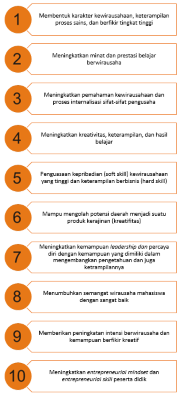
MODEL PEMBELAJARAN BERBASIS PROYEK DALAM RANAH KEWIRAUSAHAAN
Abstract
Keywords
Full Text:
PDFReferences
A. Rojko, “Industry 4.0 concept: Background and overview,” Int. J. Interact. Mob. Technol., vol. 11, no. 5, pp. 77–90, 2017, doi: 10.3991/ijim.v11i5.7072.
K. Schwab, “the Fourth Industrial Revolution (Industry 4.0) a Social Innovation Perspective,” Tạp chí Nghiên cứu dân tộc, vol. 7, no. 23, pp. 12–21, 2018, doi: 10.25073/0866-773x/97.
J. Nagy, J. Olah, E. Erdei, D. Male, and J. Popp, “The Role and Impact of Industry 4.0 and the Internetof Things on the Business Strategy of the ValueChain—The Case of Hungary,” Sustainability, vol. 10, 2018.
B. Trilling and C. Fadel, century skills. San Francisco: Jossey-Bass, 2009.
S. Kendra, 21st_Century_Skill_Handbook.pdf. Delhi: The secretary of Central Board of Secondary Education, 2020.
L. M. Fonseca, “Industry 4 . 0 and the digital society : concepts , dimensions and envisioned benefits,” 2018, doi: 10.2478/picbe-2018-0034.
Sukardi, M. Giatman, S. Haq, Sarwandi, and Y. F. Pratama, “Effectivity of Online Learning Teaching Materials Model on Innovation Course of Vocational and Technology Education,” J. Phys. Conf. Ser., vol. 1387, no. 1, 2019, doi: 10.1088/1742-6596/1387/1/012131.
S. Yulian, “Wirausaha dalam Pendidikan Abad 21,” www.suaramerdeka.com, 2018. [Online]. Available: https://www.suaramerdeka.com/smcetak/baca/132034/wirausaha-dalam-pendidikan-abad-21?page=3.
Battelleforkids, “P21 Network,” www.battelleforkids.org, 2020. [Online]. Available: https://www.battelleforkids.org/networks/p21.
N. S. Amiri and M. R. Marimaei, “Concept of Entrepreneurship and Entrepreneurs Traits and Characteristics,” Sch. J. Bus. Adm., vol. 2, no. 7, pp. 150–155, 2012.
D. La, M. Gentile, V. Dal, S. Ottaviano, and M. Allegra, “A Game Based Learning Model for Entrepreneurship Education,” Procedia - Soc. Behav. Sci., vol. 141, pp. 195–199, 2014, doi: 10.1016/j.sbspro.2014.05.034.
T. Ahmed, V. G. R. Chandran, J. E. Klobas, and F. Liñán, “The International Journal of Entrepreneurship education programmes : How learning , inspiration and resources a ff ect intentions for new venture creation in a developing economy,” Int. J. Manag. Educ., vol. 18, no. 1, p. 100327, 2020, doi: 10.1016/j.ijme.2019.100327.
P. Nilsson and J. Gro, Skills for the 21 st Century : What Should Students Learn ?, no. May. 2015.
National Education Association, Preparing 21st Century Students For A Global Society- An Educator’s Guide to The “Four Cs.” 2016.
F. Nwokike, “10 Principles of entrepreneurship,” thetotalentrepreneurs.com, 2020. [Online]. Available: https://thetotalentrepreneurs.com/10-principles-entrepreneurship/.
C. Maida and L. Angeles, “Project-Based Learning : A Critical Pedagogy for the Twenty-First Century Project-Based Learning : a critical pedagogy for the twenty-first century,” Policy Futur. Educ., vol. 9, no. 6, 2011, doi: 10.2304/pfie.2011.9.6.759.
N. Jalinus, S. Haq, and R. E. Wulansari, “VOCATIONAL TEACHER ACTIVITIES IN THE USE OF TECHNOLOGY DURING THE COVID 19 PANDEMIC,” vol. 4, no. 1, pp. 29–35, 2021.
W. Wikanta and Y. Gayatri, “Model Pembelajaran Berbasis Proyek dalam Menanamkan Karakter Kewirausahaan, Keterampilan Proses Sains, dan Keterampilan Berfikir Tingkat Tinggi Mahasiswa,” in Prosiding Seminar Nasional Pendidikan Biologi (ISBN: 978-602-61265-2-8), 2018, pp. 652–658.
W. B. Lestari, “Penerapan metode project-based learning dalam meningkatkan minat dan prestasi belajar berwirausaha pada pembelajaran prakarya kewirausahaan,” vol. 7, no. 1, pp. 107–119, 2019.
R. R. Amalia, “Entrepreneurship Education Through Project Based Learning For 3rd Grade Student of Kareng Kidul Elementary School Probolinggo Pendidikan Kewirausahaan Melalui Project Based,” J. Pendidik. Dasar Nusant., vol. 4, pp. 78–86, 2018.
D. K. D. Manggala and N. P. Nugraha, “Penerapan Model Project Based Learning Untuk Meningkatkan Hasil Belajar Mata Pelajaran,” J. Tek. Elektron. Undiksha, vol. 1, no. 1, pp. 40–51, 2019.
S. J. Dewi, S. Setiti, and M. Hasanah, “sebesar 4,862 dan t,” J. Econ. Educ. Entrep., vol. 1, no. 1, pp. 1–6, 2020.
Y. Khairat, “Penerapan Model Project Based Learning Dalam Meningkatkan Aktifitas Dan Hasil Belajar Peserta Didik Pada Mata Pelajaran Produk Kreatif Dan Kewirausahaan,” J. Teknol. Pendidik., vol. 9, no. 2, 2020.
P. Pendowoharjo, S. Bantul, and P. B. Learning, “Model Project Based Learning Meningkatkan Kreativitas dan Keterampilan Berwirausaha Siswa Saat PJJ,” J. Ris. Drh., vol. XXI, no. 3, pp. 4033–4052, 2021.
Moerdiyanto, “Perluasan Implementasi Pendidikan Kewirausahaan,” J. Econ., vol. 8, no. April, pp. 78–96, 2012.
R. M. Arpin, R. T. Mangesa, and H. Nur, “Seminar Nasional Pengembangan Model Pembelajaran Project Based Learning Untuk Meningkatkan Kreativitas Peserta,” 2017.
A. Sulasari, “Pengembangan Metode Pembelajaran Kewirausahaan Berbasis Proyek Untuk Meningkatkan Karakter Wirausaha Mahasiswa di Politeknik Negeri Malang,” JABM J. Akuntansi, Bisnis dan Manaj., vol. 23, no. 1, pp. 16–27, 2016.
E. Erwantiningsih, H. Wahyuni, and W. Immadudin, “Developing Entrepreneurial Interest and Student Independence through Project- Based Entrepreneurship Learning Pembelajaran Kewirausahaan Berbasis,” Pedagog. J. Pendidik., vol. 10, no. 2, pp. 127–145, 2021, doi: 10.21070/pedagogia.v10vi2i.1255.
E. Farida, E. T. Djatmika, B. B. Siswoyo, M. Witjaksono, and U. N. Malang, “Pengembangan Model Pembelajaran,” JPEK, vol. 1, no. 2012, pp. 8–18, 2017.
R. Afifi and L. Yulisma, “Penerapan Model Project Based Learning Dalam Praktikum Budidaya Manggot BSF ( Hermetia Illucens ) Application of Project Based Learning Model in Maggot BSF ( Hermetia Illucens ) Practicum of Students,” in Seminar Nasional Biologi, Saintek, dan Pembelajarannya (SN Bioper 2019), 2020, pp. 85–89.
R. Afifi and L. Yulisma, “Implementasi Model Pembelajaran Berbasis Proyek Dalam Praktikum untuk Meningkatkan Intensi Berwirausaha Mahasiswa,” Quagga J. Pendidik. dan Biol., vol. 12, no. 1, pp. 17–23, 2020, doi: 10.25134/quagga.v12i1.2127.Received.
I. Ilahiyyah, S. S. Iriani, and Harti, “Implementasi Project-based Learning untuk Meningkatkan Entrepreneurial Mindset dan Entrepreneurial Skills pada Siswa SMK Nurul Islam,” J. Maksipreneur Manajemen, Koperasi, dan Entrep., vol. 11, no. 2, pp. 197–211, 2022.
DOI: https://doi.org/10.24036/cived.v9i2.117804
Copyright (c) 2022 Syaiful Haq

This work is licensed under a Creative Commons Attribution 4.0 International License.